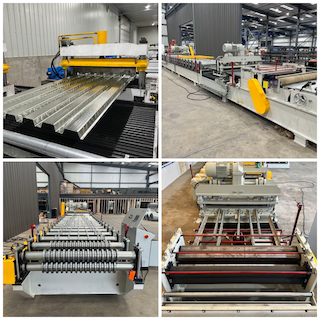To express an interest in this machine please submit the form below.

Not Sure What Machine You Need?
Select Your Profile, We'll Match It
Choose your desired profile drawing, and let Machine Matcher connect you with the best roll forming machine tailored to your needs.
Browse Profiles
Toronto, Canada, is a hub for the construction and metal fabrication industry, making floor deck roll forming machines an essential piece of equipment for manufacturers. These machines are used to produce steel floor decking—a crucial component in commercial, industrial, and residential buildings. If you’re in Toronto and looking for a floor deck roll forming machine, this guide covers everything you need to know, from machine specifications to purchasing considerations.
A floor deck roll forming machine is specifically designed to produce steel deck panels used for structural flooring in buildings. These machines create corrugated steel sheets that improve the strength of floors, support concrete slabs, and enhance the durability of structures.
Toronto’s construction industry requires high-quality steel floor decking, making floor deck roll forming machines a critical investment for businesses engaged in steel fabrication, construction, and infrastructure projects.
This machine operates continuously, taking coils of galvanized steel and shaping them into precise deck profiles. It includes advanced automation features, ensuring accuracy, efficiency, and consistency in production.
Here are the technical specifications of the floor deck roll forming machine available in Toronto, Canada:
This machine is built for high-volume production, capable of forming floor deck profiles with precision and efficiency. The 28 roll forming stations ensure smooth shaping of the steel coil.
With a 20-ton weight and an 85-ft footprint, this machine is durable and can handle high-strength materials, making it ideal for large-scale industrial operations in Toronto.
The hydraulic shear system provides clean and precise cuts, reducing material waste and increasing efficiency.
The machine operates at 480V, 3-phase, 60Hz, making it compatible with standard industrial power supply in Toronto, Canada.
Used in high-rise buildings, warehouses, and commercial projects for floor decking.
Steel processing and custom metalwork industries rely on floor deck machines to produce high-quality steel decking.
Many industrial manufacturers and contractors in Toronto use floor decks for structural reinforcement in buildings.
A floor deck roll forming machine is used to manufacture corrugated steel deck panels that serve as structural flooring in buildings. These panels are used to reinforce concrete floors in construction projects.
This machine can process 18-gauge to 24-gauge steel, making it suitable for various structural applications.
This machine has a large footprint of 85 feet, so it is best suited for large manufacturing facilities with ample space for operation and material handling.
The machine uses a hydraulic shear cutting system, ensuring clean, precise cuts for each decking panel. This minimizes material waste and enhances production efficiency.
Yes, this machine operates on 480V, 3-phase, 60Hz, which is standard for industrial facilities in Toronto, Canada.
Yes, this machine allows for customized tooling and profile adjustments, depending on the design requirements.
Regular lubrication of rollers, inspection of the hydraulic system, cleaning of the cutting area, and checking the gearbox system ensures smooth operation and long service life.
Availability depends on the supplier and stock levels. It is recommended to contact roll forming machine suppliers in Canada for delivery options and lead times.
Yes, you can import a floor deck roll forming machine from international manufacturers. Ensure compliance with Canadian safety standards and power requirements before purchasing.
A floor deck roll forming machine is a vital investment for companies in Toronto, Canada, involved in steel decking production, construction, and metal fabrication. With high-speed operation, precision cutting, and durability, this machine ensures efficient and cost-effective floor deck production.
If you’re considering buying a floor deck roll forming machine in Toronto, ensure that you choose a model that meets your production requirements, space constraints, and safety regulations.
Copyright 2026 © Machine Matcher.